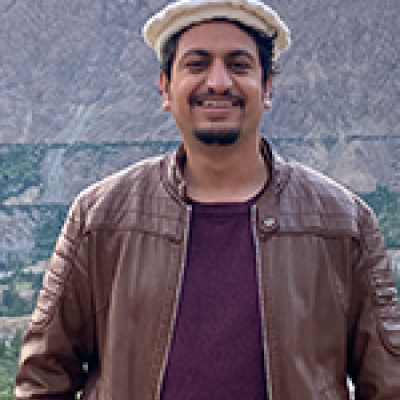Abdul Wahid Khan
Doctor of Philosophy (DPhil) in Geography and the Environment
Supervisors: Dr Ariell Ahearn and Dr Abrar Chaudhury (Saïd Business School)
Doctor of Philosophy (DPhil) in Geography and the Environment
Supervisors: Dr Ariell Ahearn and Dr Abrar Chaudhury (Saïd Business School)
The Blessings of the Commons (Muzhayo) for the Local Community and More-than-Humans of Chitral, Pakistan and the Influence of Neoliberal and Nationalization Projects: An Apocalypse of a Culturalscape
Academic Profile
Abdul Wahid Khan received his BSc in Social Development and Policy and did a graduate program at the IIS London in Islamic Studies and Humanities. Wahid Khan went on to do his MSc in Nature, Society and Environmental Governance at the University of Oxford with a dissertation on the Changing fate of maldarai (Pastoral Livelihood) in Yarkhoon, Pakistan: Neoliberalism, School Education, Climate Change and Conservation. This paper focused on how the pastoral livelihood of people in Yarkhoon, Chitral is changing towards a neoliberal lifestyle, through engagement with the rural and global politics and the diversity of discourses that describe and motivate such change using the lens of Rural Political Ecology and the method of ethnographic discourse analysis.
Through different examples of the challenges that pastoralists face in Yarkhoon, he has introduced the idea of Rural Political Ecology, distinct from Urban Political Ecology, as a lens to look at socio-natural phenomena of rural areas that can help us understand the politics, nature, conflicts, and paradoxes of rural regions regarding resources management and livelihood options. Through this dissertation, he suggests that any external intervention regarding climate change, progress or school education in pastoral communities must not think as a “developmentalists” but as a pastoralist, because pastoral communities have a much deeper understanding of these local issues as their livelihood is closely knit with and highly dependent on the environment.
In 2021, Wahid Khan was awarded the IIS Doctoral Scholarship to pursue a PhD in Geography and the Environment at the University of Oxford. His thesis will explore an alternative discourse on commons, based on the Muslims’ approaches to the environment and climate change and the local wisdom, to the dominant literature around the legitimization of the land-grabbing of common lands from the local communities without considering the meaning and value of these areas or the impact on local pastoral livelihoods. Climate change, global warming, and natural disasters have made lives despondent for people around the globe.
Climate change and environmental degradation exacerbate the vulnerability of mountain communities, and it is necessary to document and study their catastrophic influence on the local communities living in such regions. This study represents the perspective of a local researcher from Chitral, Pakistan who argues that there is spiritual significance attached to the commons for the people and vice versa in Chitral. This project highlights local commons management in Chitral based on spiritual and religious beliefs, traditional practices, and environmental values. The commons are usually considered primarily within the field of economics, but in Chitral, it must be looked at as a melting pot of cultures, geographies, religious beliefs, communities, and More-Than-Humans (a term used in the field of Geography for non-human entities in nature, like trees, animals, etc). Hence, to study the commons and the indigenous relationship to the commons, a better understanding of pastoral land management which considers a spatial perspective, history, gender, caste, and power relations will be explored in this research contributing to the important topic of understanding of commons in vulnerable communities and their dependence and relation with the land amidst the drastic global climate change.
Previously, Wahid Khan worked as the head of the Chitral Heritage and Environmental Protection Society in which he motivated and activated youth to work for environmental stewardship in all major cities of Pakistan. He is also the founder of Chitral Academics Circle that is trying to attract more people in Chitral to engage in meaningful research. Last year, he worked with the Oxford University think tank on China-Pakistan Economic Corridor and this year Wahid is the Environment officer at Reuben College, Oxford.





